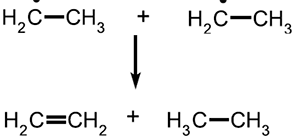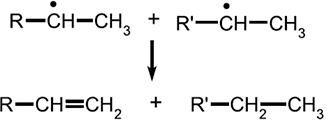ქიმიის ტერმინთა განმარტებითი ლექსიკონი
- ინგლისურ-ქართული
- ქართულ-ინგლისური
- ლექსიკონის შესახებ
- გამოხმაურება

| disproportionation | დისპროპორციონირება (1) |
Synonym: dismutation
where A, A' and A' are different chemical species. For example:
The reverse of disproportionation is called comproportionation. A special case of disproportionation (or "dismutation") is "radical disproportionation", exemplified by:
Reactions of the more general type:
are also loosely described as radical disproportionations.
Example:
The term also applies to an internal oxidation-reduction process as occurs, for example, among the iron atoms of CaFeO3, where
|
სინონიმი: დისმუტაცია
სადაც A, A' და A' სხვადასხვა ქიმიური ნაწილაკია, მაგალითად:
დისპროპორციონირების საპირისპირო პროცესს ეწოდება. დისპროპორციონირების (ან „დისმუტაციის“) განსაკუთრებული შემთხვევაა „რადიკალური დისპროპორციონირება“, რომლის მაგალითია:
რადიკალურ დისპროპორციონირება მიაკუთვნებენ უფრო ზოგადი ტიპის რეაქციებსაც, როგორებიცაა:
ტერმინი ასევე ეხება შიგამოლეკულური ჟანგვა-აღდგენის პროცესს, მაგალითად, როგორც ეს ხდება CaFeO3-ში რკინის ატომებს შორის:
|
| Source | წყარო: 1.PAC, 1994, 66, 1077 (Glossary of terms used in physical organic chemistry (IUPAC Recommendations 1994)) on page 1107 2.PAC, 1994, 66, 577 (Definitions of terms relating to phase transitions of the solid state (IUPAC Recommendations 1994)) on page 581 3.PAC, 1994, 66, 577 (Definitions of terms relating to phase transitions of the solid state (IUPAC Recommendations 1994)) on page 581 |
|














